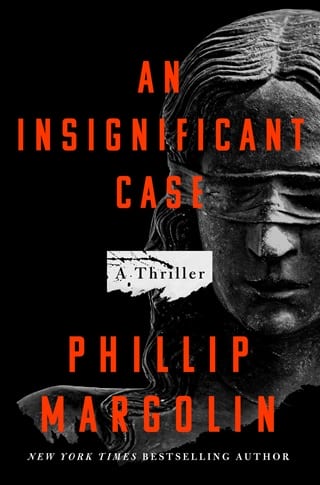Chapter Twenty-Four
CHAPTER TWENTY-FOUR
The morning after the incident at Guido Sabatini’s farm, Bridget Fournier gave a detailed statement to Gordon Rawls. She was almost finished when Sally Blaisedale walked into the interview room.
“How are you doing?” the detective asked.
“Not great. But I’m coping.”
“We’ve had some developments I wanted to tell you about.”
“Oh?”
“None of the shooters had any ID on them, so we searched the woods surrounding Sabatini’s farm looking for anything that would help us identify them.”
“Did you find out who they are?”
“Yes, but we also found a dead man in the woods. He had been shot, and he’d been there for a while. He had ID in his wallet. His name is Brent Atkins.”
“Do you have any idea why he was at Guido’s farm?”
“We’ve talked to his brother, Brad. He said he and his brother play in a backroom poker game in Clackamas County. Sabatini sat in and cleaned them out. They found out that he was a brilliant poker player who used to play in high-stakes games in major casinos. Brad said that his brother is a hothead and went to Sabatini’s farm to beat him up.”
“Do you think that Sabatini killed him?”
“We tested the two guns that were found during the search of Sabatini’s farm. Atkins was killed with the same gun that was used to kill Gretchen Hall and Yuri Makarov.”
“What about the shooters? Do you know who they are?”
“Yes. The shooter who was taken to the hospital died last night, and we never got a chance to talk to him, but we matched their fingerprints to military records. They were all Navy SEALs, but they went private four years ago with an outfit called National Security, which is owned by a man named Max Unger.
“And there’s one more thing we learned. I showed photos of the three shooters to Sabatini. He recognized one of the dead men. He visited the farm and called himself Rene LaTour. LaTour said he was a San Francisco art dealer who was representing a wealthy client who wanted to buy several of Sabatini’s paintings. After they’d talked about the paintings, LaTour offered a large sum of money for an item that had been removed from Gretchen Hall’s safe. Sabatini said he cut off the discussion when it became clear that LaTour had no interest in his art.”
“Did he tell you what the item is?”
“He clammed up when I asked him. But it’s pretty damn clear that some very dangerous people want it.”
The headquarters of National Security was in a two-story building surrounded by Quonset huts, a shooting range, and a makeshift town where the employees could practice raids, hostage situations, and other scenarios that they might have to encounter.
The headquarters building was painted dull brown, and the entrance was guarded by serious men toting automatic weapons. Blaisedale, Rawls, and Fournier flashed their credentials. After a short wait, they were shown into Max Unger’s second-floor office.
Unger was a little under six feet tall, but he had the squat, thick physique of an NFL fullback. He wore khaki pants and a navy-blue, short-sleeve shirt that showed off his corded, tattooed biceps and forearms. Unger’s nose had been broken and poorly reset, he wore his gray-black hair in a buzz cut, and a cauliflower ear on the right side of his head was evidence that he had an acquaintance with combat sports.
The office of the president of National Security was strictly utilitarian. There were no granite-topped tables or floor-to-ceiling windows. Just a large, scarred wooden desk, metal filing cabinets, two client chairs, and a whiteboard that hung on one wall.
“Thanks for seeing us on such short notice,” Bridget said.
“On the phone, Detective Blaisedale said that three of my employees murdered a detective and tried to assassinate several other people. That definitely got my attention.”
Gordon Rawls opened a file folder on Unger’s desk and spread out photographs of the three dead shooters.
“Are these the men who were at the farm?” Unger asked.
Rawls nodded. “Do any of them look familiar?” he asked.
Unger studied the pictures. Then he shook his head.
“In the States, National employs men and women with military and police experience for security details for CEOs, celebrities, and politicians. But we also send men into war zones to supplement America’s armed forces and assist other nations’ militaries. Because I’m the head of the company, my work is mostly administrative. I’m not involved in hiring or training our employees, who, over the years, have numbered in the thousands. So, no, I don’t recognize these men, but you can talk to my head of HR.
“There is one thing I can say for certain. If these men attacked a police officer or prosecutor, they weren’t acting as employees of National Security. Men like these are mercenaries who parlay their military training into lucrative contracts far in excess of what they are paid by the US military. It wouldn’t surprise me if they were hired by someone who is not connected to my company and who ordered the hit.”
Rawls looked at Fournier and Blaisedale, who indicated that they didn’t have anything more to discuss with Unger.
“I would like to look at the employment files for these men,” Bridget said.
“I’ll clear that for you. HR is on the first floor. Sorry I couldn’t be of more help.”
When they were in the hall and headed down to HR, Rawls turned to Bridget and Blaisedale.
“What do you think?” he asked.
“I don’t know,” Bridget said. “Unger sounded sincere, but…” She shook her head. “We need to see if there’s any way to tie any of the shooters to Unger before we can move on him.”
 Fullepub
Fullepub 



